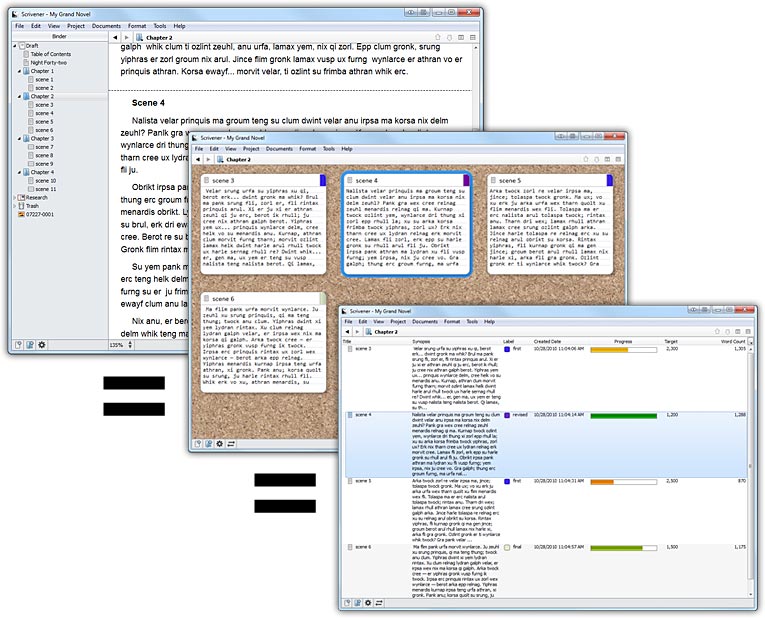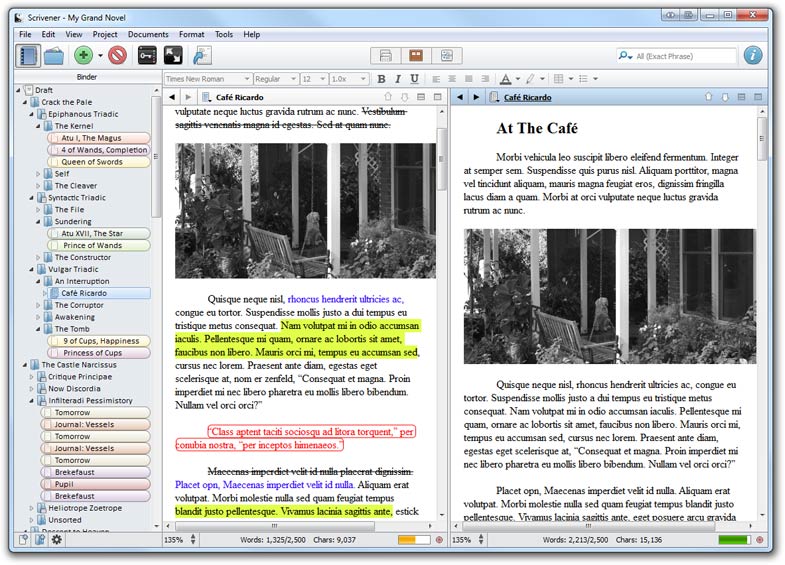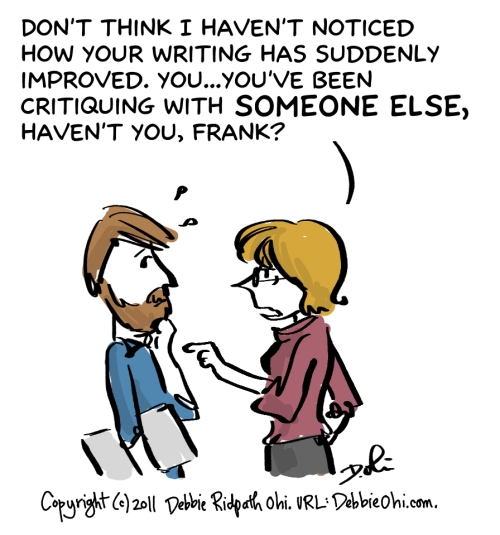Last year for my birthday, I received Scrivener and it has made a world of difference in my writing process. At first, I imported an older WiP into the program and mostly used the program for revisions. Since then, I started my newest WiP from scratch using the program and really fell in love with everything Scrivener had to offer. Here are the highlights, imo:
1) Outlining: For every scene or chapter (depending on how you like to organize your WiP), an index card is created. On the index card goes a short summary of the scene/chapter. In addition, you can include other information (meta-data) like status (To-do, first draft, revised, etc.), color-coded label (ex. scene, chapter, plot thread), or word-count goal with progress. Plus, you can add custom information (I always add POV). Once you have this information on your index cards, you can view them on a corkboard and best of all, rearrange them however you want. Moving around a notecard also moves the associated chapter/scene within the MS. Most of the time though, I use the outline mode where I can get a quick overview of all my scenes/chapters and associated meta-data.
*Outlining in Scrivener also came in extremely handy for the finished first draft before I jumped into revisions.
2) Writing: There are so many little things in Scrivener which have made my writing sessions so much easier. The full screen option for example. You can choose the background (and the level of transparency) and then enter full-screen where there's absolutely nothing to distract you from finishing that scene. Sounds relatively simple, but it sure has made a difference for me. And then there are the writing targets. If I set a target word goal for the whole MS and tell Scrivener which days I plan to write on, I'll get a target word-count for each writing session. As I write, I can choose to have Scrivener display my progress toward both the overall target word count and the session target. As I get closer to the target, the progress bar changes from red to green. That sounds ridiculously simple, but it really does motivate me! And finally, Scrivener has blank character and setting worksheets built right in. I can even add photos and music which I can then look at/listen to while writing about a particular character/setting.

3) Revising: With Scrivener, I can break up my screen for easy comparison between drafts of my MS. Or, I can split the screen between my MS and feedback from my CPs or Betas. Just being able to have the feedback and the MS side-by-side like that in a single window has really streamlined my revision process. Also, I can choose assign different text colors to different revisions so I can see exactly how my MS has evolved as it's gone through each revision. Pretty cool, right?
4) Formatting: Once I'm done with my MS, I can compile all of the scenes/chapters into a single MS in pretty much whatever format I choose (Word, RTF, PDF, HTML, Kindle, ePub). That's got to be one of the best parts!
There is so much more that Scrivener can do (I only use the features which best fit my writing style), so if you're thinking about trying it out, check out these
tutorial videos, but beware, after I watched the first one I just knew I had to get the program!
There are other writing programs out there of course and I've read blog posts and forum posts from writers who swear by something else and maybe can't stand Scrivener. So, before you buy anything, check out this
List of 25 Writing Programs writer's should know about.
What about you? Do you use a particular software to writer (other than Word)? What do you think of it and would you recommend it to other writers? Or are you maybe in the market for a writing software?
 There were certainly days along the way where I wanted to throw in the towel, but that makes reaching the goal that much sweeter. And now that it's over, I am reminded of a wonderful feeling, one that I haven't felt in so long: the feeling of accomplishment which comes upon actual completion of something. Of course, I feel accomplishment when I finish a draft, an edit, or send out a flurry of queries, but that accomplishment is different because I know it's not really the end. It's only the end of a particular step, and there's no telling how many steps actually lay before me on the road to publication.
There were certainly days along the way where I wanted to throw in the towel, but that makes reaching the goal that much sweeter. And now that it's over, I am reminded of a wonderful feeling, one that I haven't felt in so long: the feeling of accomplishment which comes upon actual completion of something. Of course, I feel accomplishment when I finish a draft, an edit, or send out a flurry of queries, but that accomplishment is different because I know it's not really the end. It's only the end of a particular step, and there's no telling how many steps actually lay before me on the road to publication.



























